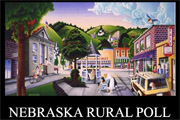Agricultural Economics, Department of

Nebraska Rural Poll
Date of this Version
2020
Document Type
Report
Citation
Nebraska Rural Poll, Research Report (October 2020) 20-4, 19 pages
Institute of Agriculture and Natural Resources, University of Nebraska-Lincoln
Also available at https://ruralpoll.unl.edu/pdf/20agriculture.pdf
Abstract
Most rural Nebraskans have farming or ranching history in their family. In fact, one-half of rural Nebraskans are one generation or less removed from the farm or ranch. Rural Nebraskans’ connection to agriculture has not changed much in the last ten years.
Most rural Nebraskans view their economic well-being as being dependent on both production agriculture in general and animal agriculture in particular. Furthermore, most rural Nebraskans say the economic well-being of their community or county is very much dependent on the economic success of both production agriculture and animal agriculture.
Most rural Nebraskans are supportive of new livestock development and having a logical process for approving that development. However, many rural Nebraskans are not familiar with the Livestock Friendly County designation. Four in ten rural Nebraskans report that they know whether or not their county is currently designated as a Livestock Friendly County and just under one-third agree that they are familiar with and understand what the designation means.
Opinions are also mixed on the impacts of the designation. Just under two in ten rural Nebraskans (19%) agree that the designation would limit local/county control and limit local input in the process. However, 17 percent disagree and almost two-thirds neither agree nor disagree with the statement. Similarly, equal proportions both agree and disagree that encouraging new livestock development would not be beneficial for their county if the growth is primarily large scale operations.
Included in
Agribusiness Commons, Agricultural and Resource Economics Commons, Civic and Community Engagement Commons, Community-Based Research Commons, Demography, Population, and Ecology Commons, Entrepreneurial and Small Business Operations Commons, Place and Environment Commons, Public Affairs, Public Policy and Public Administration Commons, Regional Economics Commons, Rural Sociology Commons

